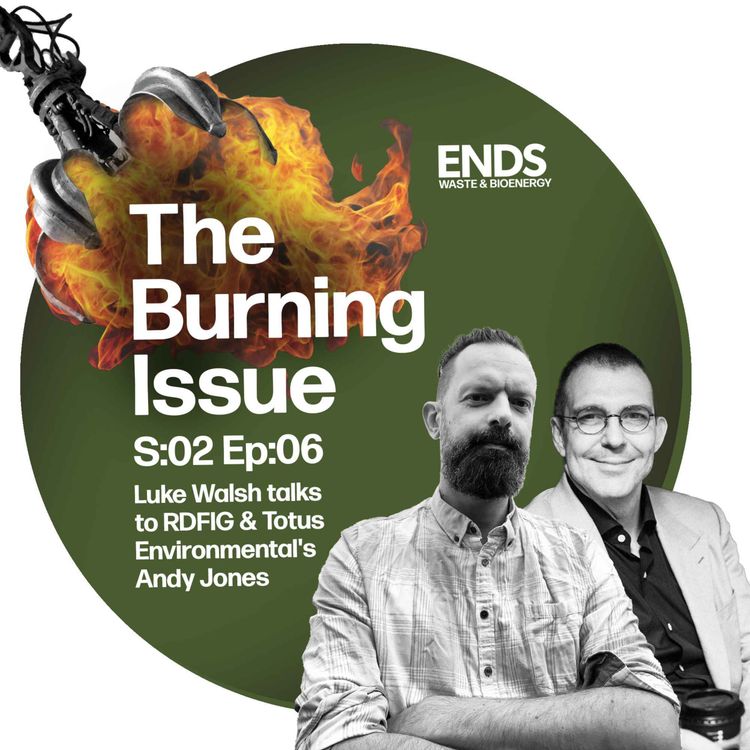Share

The Burning Issue
RDFIG & Totus Environmental's Andy Jones on the UK importing waste and TFS issues
Season 2, Ep. 6
•
Every fortnight the Burning Issue looks at different elements of the energy recovery sector, taking the starting point that while energy recovery has moved some waste out of landfill, where does the sector go from here?
In this sixth episode of series two, the Burning Issue speaks to Andy Jones, chair of the RDF Industry Group and managing director of Totus Environmental.
The episode focuses on:
- Why there is no reason to ban the legitimate export of waste
- Waste exporters “sympathetic” to the EA’s current plight, but improvements to the TFS process are needed “quickly”
- Could the UK start to import waste?
- Is the UK already over capacity in terms of EfW plants?
More episodes
View all episodes

2. Andy Bedford of Encyclis on the development of the UK's first full scale carbon capture project for energy-from-waste at the Protos plant
25:06||Season 5, Ep. 2For the second episode of the fifth series, the Burning Issue talks to Andy Bedford, low carbon development director at Encyclis, about the development of the UK's first full scale carbon capture facility for the energy-from-waste (EfW) sector. This episode discusses: Andy's role in leading the Protos carbon capture project and the story behind the developmentThe challenges faced and how they were overcomeHow carbon capture works alongside an EfW facilityWhat does Protos mean for the potential future roll-out of carbon capture in the Encyclis fleet and the wider UK EfW sectorScepticism about achieving commercial-scale carbon capture deployment in the UK EfW sector
1. Enfinium’s Mike Maudsley on Resource Recovery UK and on how Enfinium is delivering homegrown energy and decarbonisation powered by waste
20:28||Season 5, Ep. 1For the first episode of the fifth series, the Burning Issue talks to Enfinium’s Mike Maudsley on his role as chair of Resource Recovery UK and on how Enfinium is taking major steps forward in delivering homegrown energy and decarbonisation powered by waste. This episode discusses: How industry alliance Resource Recovery UK (RRUK) is advocating on behalf of the energy-from-waste (EfW) sector to promote its role in the pathway to green growth, net zero and a circular economy.What’s been keeping Mike busy since he took over as RRUK chair from Owen Michaelson in March this yearCurrent areas of focus for the alliance and the challenges ahead.Enfinium’s newly opened Skelton Grange EfW facility and progress so farCarbon capture plansHow work is going on Enfinium’s under-construction Kelvin EfW plant
5. Shoal’s Sean Austin and Charlie Grayson talk balancing speed and safety, how accident are ‘catalysts’ for change and why building an EfW plant is like Formula one
34:05||Season 4, Ep. 5For the fifth episode of the fourth series, the Burning Issue looks at health and safety in the EfW sector.This episode focuses on: What happens when something does go wrong at an EfW build“Accidents are tragic, but they can be powerful catalysts for change”What are businesses doing to support social sustainabilityWill the spread of AI support H&S and what problem could it bringCompany is currently “facilitating and supporting” around 90% of UK EfWs How to balance speed and safety when deadlines are looming
4. Green Giraffe's Micheal Ware on why funding is hard for EfWs, how investors are loving AD, and turning Wotsits into biogas
23:55||Season 4, Ep. 4For the fourth episode of the fourth series, the Burning Issue looks at the state of the market for investors in EfW and bioenergy This episode focuses on:Why the company is called Green Giraffe How it’s raised £35bn Why heating prisons with EfW is a captivating concept SAF is a hugely growing sectorCould failed gasification plants be converted to waste-to-X projects How to get over grid connection woes Turning Wotsits into biogas
3. 7CO2 directors on non-pipeline carbon capture and making energy recovery the ‘net in Net Zero’
27:24||Season 4, Ep. 3Severnside Carbon Capture and Shipping Hub (7CO2) directors Paul Davies and Keith Birch tell the Burning Issue of the advantage of non-pipeline carbon capture and how it is developing.This episode focuses on:Advantages of flexible non-pipeline carbon capture As the EfW becomes “saturated, CCS is the big area for growth”Why energy recovery can put the ‘Net in Net Zero’Track 2 could see “some uptake of new emerging technologies”How EfW plants could become mini-hubs for CCSCombining SAF production with carbon captureGovernment needs to extend existing Track 1 provisions to Track 2 projects
2. Encylis director of policy and sustainability Victoria Merton on carbon capture at Protos, building more facilities
30:16||Season 4, Ep. 2Encylis director of policy and sustainability Victoria Merton on carbon capture at Protos, building more facilities and banning recyclets and biogenics from landfill by 2028This episode focuses on:How a team of skilled engineers are looking to build CCS across Encyclis’ portfolio Being a year ahead of nearest rival on full-scale EfW carbon capture project Development of the Protos plants has hit some “speed bumps”A ban on all recyclets and biogenics going to landfill by 2028 Preparing for EfW’s inclusion in the UK ETS Building more capacity in tougher market conditionsDelivering heat from EfW in Dublin and elsewhere New trade body Resource Recovery UK (RRUK) A graduate of the University of Birmingham, Victoria Merton joined Encyclis when it was called Covanta in 2021 having held senior roles at The Peel Group.
1. Hitachi Zosen Inova CEO Bruno-Frédéric Baudouin on the end of EfW, the start of waste-to-X, and building the facilities of the future
29:02||Season 4, Ep. 1Hitachi Zosen Inova (HZI) chief executive Bruno-Frédéric Baudouin tells EWB editor Luke Walsh talks about how the business is developing a new generation of waste processing plants.This episode focuses on:HZI evolving progressively into the leading EfW builder globallyHow the business has, mostly, avoided the financial issues plaguing other EPC builders Moving into the O&M marketFixing plants left unfinished by others Developing a CCS pilot in the UK with Enfinium Why waste-to-X is the future of the sector Now based in Zürich, French national Bruno-Frédéric Baudouin, joined HZI in 2018. He previously held senior roles at GE Power and Alstom Power. A former student at the Ecole Polytechnique of Paris in the 1990s he also achieved a Master of Business Administration from leading business school the Institut Européen d'Administration des Affaires (INSEAD) in 2004.
10. Enfinium's Karl Smyth on carbon capture, EfW's inclusion in the UK ETS, and how big a tonne of CO2 really is
23:39||Season 3, Ep. 10EWB editor Luke Walsh talks to Enfinium's director of external affairs and strategic policy Karl Smyth about building carbon capture at the UK’s largest EfW site This episode focuses on:Developing a CCS pilot at the Ferrybridge EfW site next month What comes next after the permitting pause and expected strategic review of EfW capacity With a general election due will a change of government increase focus on the waste sectorUK ETS will “encourage innovation around contracting” Two more EfW plants expected operational next year How a total of six EfW facilities is “probably” enough for the companyWhy carbon capture is like squeezing a double decker bus through a small pipe network
9. The ESA’s Jacob Hayler on a potential UK EfW moratorium, should Barclay stay at DEFRA and why landfill tax fraud is “creating a huge distortion” in the market
25:19||Season 3, Ep. 9EWB editor Luke Walsh talks ESA executive director Jacob Hayler as the development and future of the UK’s energy-from-waste sector is thrown into the air by the government’s controversial block on new environmental permits. This episode focuses on: Could an EfW moratorium be in Labour’s general election manifesto “Political interference” in the permitting processShould DEFRA minister Steve Barclay resign?Government has spread investor concern over the entire permitting processIndustry has a “perception that there is a lack of coordination and joined up clarity” within the current government EA struggling with lack of funds and “too many constraints” Concerns including EfW in the UK ETS will lead to “carbon tourism or leakage”Hayler joined the ESA from the city in 2005 as an economist, and has worked to develop market-focused policies that combine environmental and economic sustainability. He also has responsibility at the trade body for policy relating to finance, tax, carbon management, contracts and of course EfW.